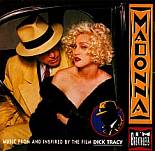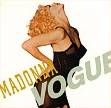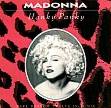 |
|||||||||||||||
|
|||||||||||||||
|
|||||||||||||||
| << back | 1 2 3 4 5 6 7 8 9 10 11 12 13 14 | next >> |
Talk about starpower: I'M BREATHLESS features the club classic "Vogue," which many consider to be Madonna's greatest song, and three tunes by Broadway composer Stephen Sondheim, including the Academy Award-winning "Sooner Or Later." But because "Vogue," which is also available on THE IMMACULATE COLLECTION, doesn't quite fit in with the rest of the album--a collection of novelties and show tunes that live up to the subtitle "Music From And Inspired By The Film DICK TRACY"--and because the rest of the album doesn't quite fit in with Madonna's more familiar work, fans might be tempted to pass up I'M BREATHLESS. That would mean missing out on an essential, oft-hidden side of Madonna as well as missing out on vocal performances that critics agree rank among her best. With tracks like "I'm Going Bananas" and "Hanky Panky," I'M BREATHLESS may be a Madonna oddity, but it's an oddity fans will want in their collection. Source: MTV.com An alternative subtitle could be Madonna Goes Broadway in a Major Way. She pulls it off with brass and panache, but then everybody knows Madonna doesn't mess around. Compared with Prince's mechanical-sounding Batman LP, at any rate, I'm Breathless stands as a unified whole – a fully realized concept album. Whether that's a compliment depends on what you think of the concept itself. This recording may seem like a conceit to listeners who are unenchanted by – or have barely heard of – the musical stage tradition. (The vast majority of Americans, in other words.) Madonna's new album will automatically introduce Stephen Sondheim – who wrote three new songs for Madonna to sing in Dick Tracy – to a whole new audience, but exactly what kind of impression Sondheim will make, well, that remains uncertain. The Dick Tracy juggernaut just might trigger a sudden mass craving for this stuff: campy, acutely stylized musical period pieces that recall the late Forties. After Batman, anything is possible. Among a more select audience, Sondheim is already regarded as the most imaginative composer working in his field. His musicals, like Sweeney Todd and Sunday in the Park With George, are light-years beyond Cats or Phantom of the Opera. More than you'd expect, Madonna measures up to the challenging new material, holding her own against Sondheim's heavy credentials and his penchant for studied, solemn melodies. Her breathy emotionality fits "Sooner or Later" like a glove: Madonna doesn't coo, "I always get my man"; she spits it out like fire, bringing fresh conviction to a somewhat generic line. Even during this album's most melodramatic or self-conscious moments – and there are several – Madonna never sounds like she's "just acting." At times, though, the wit and sophistication of Sondheim's lyrics work against Madonna's more forthright charms. There's a certain distance inherent in these songs; the music consciously draws on the prerock past, while the lyrics savor tricky wordplay and dispense witty observations about love and life. It's satisfying to hear Madonna's voice amid a genteel acoustic piano and reeds arrangement, for a change, on "Sooner or Later," but the other two Sondheim contributions included here sound a bit forced. "What Can You Lose" unfolds slowly; it's a courtly his-and-hers torch song, with the veteran Broadway performer Mandy Patinkin supplying the male voice. At first, his voice is a warm contrast to Madonna's, but then he leaps up an octave or three, assuming a grating, obviously affected tone – pure Felix Unger to anyone with rock & roll ears. "More," meanwhile, is something of a kick. A swaggering, jivey uptempo number, this gold digger's anthem would seem custom-made for Madonna. She recites the ditzy, materialistic mantra with aplomb and a winking sense of irony, but something vital is missing from "More." The tip-off comes near the end of the song: Once you "have it all" with Mr. Right, Madonna allows, this all-consuming quest for "More" becomes redundant. That comes with the territory – most musicals offer a happy ending and a tradition-affirming moral. But the "Material Girl" would never have indulged in such tidy sentimentality. The brazen sexiness and vulnerability that have always supported Madonna's image of toughness and resolve are deeply buried on most of I'm Breathless under new layers of artifice and theatricality. The album's other songs don't appear in the film, but they could have. Working with longtime collaborator Patrick Leonard, as well as Andy Paley, among others, Madonna has come up with several more-legitimate sounding and confidently sung show tunes without a trace of disco. "Cry Baby," "I'm Going Bananas" and "Hanky Panky" – the titles alone are enough to conjure up visions of the elaborate production numbers on Madonna's summer tour. That's good news for ticket-buying fans, but on the record the long-term appeal of these shenanigans is sharply limited. I'm Breathless does have its commercial ace in the hole – maybe a pair of them. The album's opening track, "He's a Man," chugs with the churning inevitability of a power ballad, and Madonna's haunting vocal hangs in the air long after the music has faded. "Back in Business" flirts with the kind of catchy slow-verse-fast-chorus construction that begins as a novel hook and ends as a nagging headache. Remember, you've been warned. Madonna has still got a redeeming sense of humor. Just at the point I'm Breathless starts to sound terminally indulgent – when warblin' Warren Beatty comes a-callin' on the hokeypokey "Now I'm Following You (Part 1)" – Madonna gives herself a giant poke in the ribs and brings the whole affair back down to earth. "Now I'm Following You (Part II)" is nothing more or less than a scratch mix of part 1. By laying some much-needed beats atop this nostalgic riff, Madonna turns the whole album upside down and indicates that she still knows what time it is. "Vogue" preceded I'm Breathless as a single, and at first it sounded a bit lackluster, but when heard as the last song on an ambitious, inconsistent album, this simple dance-craze celebration gains a startling resonance. Voguing is disco dancing at its most narcissistic: a true escapist fantasy. A series of improvised model moves struck to the deafening sound of house music, this inner-city trend may already be passé. But if any singer can claim to understand and embody the transcendent appeal of posing, it's Madonna. She's been voguing since the beginning of her career, acting like a superstar and waiting for the rest of the world to catch up. For all her shrewdness, savvy and image mongering, the magic in Madonna's music has always come from the overwhelming, incredible sense of empathy in her singing. On "Vogue," Madonna communicates exactly how vital and important a silly dance-floor ritual can be to its practitioners – more primitive, and also much more real, than any Broadway musical. No other pop star today could – or probably would – make an album like this, but the throbbing beat and emotional wallop of "Vogue" make the rest of I'm Breathless seem academic, a brisk exercise as opposed to a sweaty, cathartic workout. More than any pop singer since her Motown forebear Diana Ross, Madonna seems obsessed with making it big in the more-traditional showbiz world of musicals and movies. And like the ruling Supreme, she may yet become a prisoner of her own aspirations toward Hollywood. That's entertainment. In the meantime, whatever the fate of Dick Tracy and I'm Breathless, "Vogue" proves Madonna can still deliver that indefinable something extra. For now, that's enough. Source: Rolling Stone, Mark Coleman, June 14, 1990 |
||
| << back | 1 2 3 4 5 6 7 8 9 10 11 12 13 14 | next >> |

|
||||||||||||||||||||||||||||||||||||
|
||||||||||||||||||||||||||||||||||||




